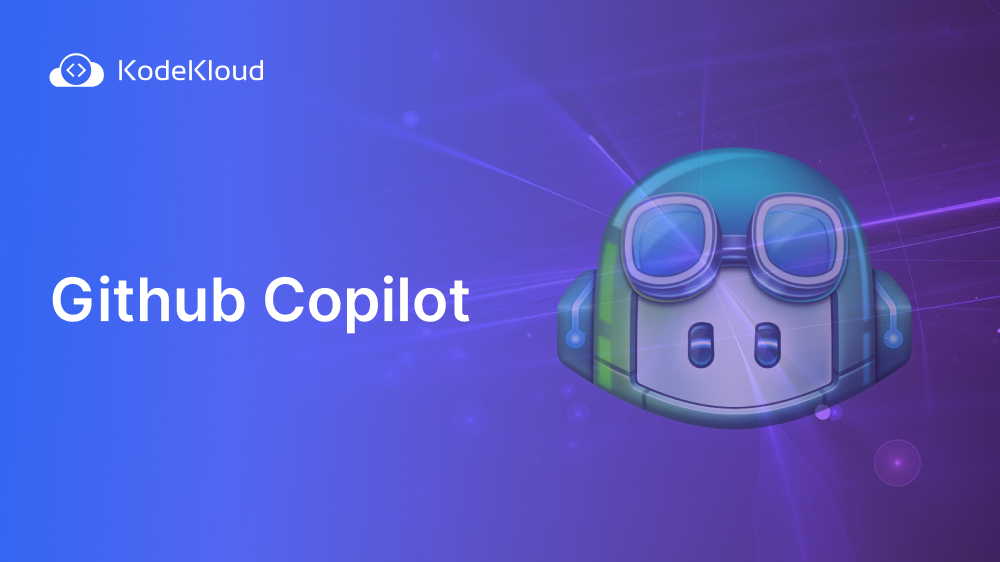GitHub Copilot is a groundbreaking coding assistant that has been making waves in the development community. Powered by advanced artificial intelligence (AI) models and developed by GitHub, Copilot aims to transform the way we write code.
In this comprehensive blog, we will explore the inner workings of GitHub Copilot, its remarkable features, and how it can revolutionize your coding experience.
What is GitHub Copilot?
GitHub Copilot is an AI-powered code auto-completion tool that integrates seamlessly with popular code editors like Visual Studio Code. It leverages state-of-the-art machine learning techniques and deep learning models, trained on a massive corpus of code, to provide intelligent code suggestions in real-time.
Whether you're working on a personal project or collaborating in a team, Copilot assists you by generating relevant code snippets, function implementations, and even suggesting comments, significantly boosting your productivity.
Try the Git Initialize Repository Lab for free.

How does GitHub Copilot work?
At its core, Copilot utilizes a language modeling approach to understand and predict the code you want to write. By analyzing the context of your code, including variable names, function signatures, and surrounding code patterns, Copilot generates accurate suggestions that align with your intentions.
GitHub Copilot seamlessly integrates with various popular code editors and integrated development environments (IDEs). Whether you prefer Visual Studio Code, JetBrains IDEs, or other widely used editors, you can leverage the power of Copilot within your preferred coding environment. This integration ensures a smooth and familiar experience for developers, enhancing their workflow without the need for significant adjustments.
It is built on advanced machine-learning models and benefits from continuous learning and improvement. The models are trained on a vast amount of publicly available code repositories, which enables Copilot to capture diverse coding patterns, idioms, and best practices. With each iteration and update, Copilot's AI models become more refined, accurate, and adept at generating relevant and high-quality code suggestions.
The tool is designed to operate locally, meaning that the code you write stays on your local machine and is not sent to any external servers. This approach ensures that your code remains private and protected.
Want to polish your coding skills by “working” in a company and performing real tasks on real systems? Check out KodeKloud Engineer, an environment where students gain real hands-on experience by working on real project tasks on real systems!
Benefits of using GitHub Copilot
Below are some of the benefits offered by GitHub Copilot:
- Increased Productivity: GitHub Copilot automates repetitive coding tasks, saving you time and effort. Providing relevant code suggestions eliminates the need to search for documentation or reference external resources, allowing you to focus on solving more complex problems.
- Improved Code Quality: Copilot follows established coding conventions and best practices, helping you write cleaner, more maintainable code. It assists in catching potential bugs, suggests optimal code structures, and promotes consistency throughout your codebase.
- Faster Prototyping: With Copilot's ability to generate code snippets on the fly, you can quickly prototype ideas and explore different approaches. It accelerates the development process, enabling you to iterate and experiment more efficiently.
- Learning Resource: GitHub Copilot is valuable, especially for novice developers. By observing the suggestions made by Copilot, you can gain insights into coding patterns, idiomatic expressions, and industry-standard practices, helping you improve your coding skills.
- Eases learning: Another benefit of GitHub Copilot is that it can significantly reduce the barrier to entry for new developers. With the AI-powered tool providing code suggestions and guidance, developers can more easily navigate unfamiliar codebases and quickly come up to speed on new projects. This can be especially valuable for new team members or junior developers who may be less familiar with a codebase or programming language.
Getting Started with GitHub Copilot
To get started with GitHub Copilot, you need to sign up for GitHub Copilot and choose a membership plan. When writing this article, Copilot is offering individuals a $10/month plan or $100/year plan. Both plans come with a 1-month free trial. Learn more about GitHub Copilot Plans.
Let’s now learn how to set up GitHub Copilot.
Step 1: Setting up GitHub Copilot in your preferred editor
To begin using GitHub Copilot, install the Copilot plugin in your preferred code editor, such as Visual Studio Code. The installation process is straightforward and well-documented on the GitHub Copilot website. Follow the provided instructions to install the plugin and get ready to supercharge your coding experience.
Step 2: Connecting GitHub Copilot to your code repository
Once the plugin is installed, you can connect GitHub Copilot to your code repository. The process involves linking your repository with Copilot using your GitHub account credentials. This allows Copilot to analyze your project's codebase and provide more contextually relevant suggestions.
Step 3: Customizing GitHub Copilot's behavior and preferences
GitHub Copilot offers customization options to tailor its behavior and preferences to your coding style. You can configure various settings, such as indentation preferences, line length limits, and even the verbosity of suggestions. Experiment with these settings to align Copilot with your personal coding preferences and make the tool feel like an extension of your own coding style.
Leveraging GitHub Copilot's AI-powered Code Suggestions
GitHub Copilot can generate entire functions, classes, or blocks of code based on the context and patterns it has learned from the training data. For instance, Copilot can generate the function body with relevant parameters and return types when you start writing a function declaration. This saves you time and allows you to focus on the key logic of the function.
Here are some of the other ways you can leverage Copilot to enhance your coding workflow:
- Code refactoring: GitHub Copilot can assist in refactoring your code by suggesting more concise or efficient alternatives. It identifies redundant code blocks, simplifies complex expressions, and recommends better coding patterns, leading to cleaner and more maintainable code.
- Error handling and exception handling: Copilot can aid in handling errors and exceptions by providing suggestions for error-checking mechanisms and exception-handling blocks. It helps ensure that your code is robust and resilient to unexpected scenarios.
- Standard library utilization: GitHub Copilot has an excellent understanding of the standard libraries and built-in functions of different programming languages. It auto-suggests appropriate library functions, eliminating the need for manual implementation and reducing the chances of errors.
- Language-specific best practices: Copilot is trained on a wide range of code repositories, making it familiar with language-specific best practices. It can guide you in adhering to industry standards and conventions, resulting in more readable and maintainable code.
- Custom codebase training: While GitHub Copilot is trained on a vast amount of publicly available code, you can further enhance its capabilities by training it on your custom codebases. By providing Copilot with access to your project-specific code, you enable it to generate more accurate and context-aware suggestions tailored to your specific application domain.
- Enabling consistency across teams: GitHub Copilot can be a valuable asset in a team development environment. It assists in maintaining coding standards across the team by suggesting consistent code styles and practices. Copilot's suggestions can serve as a starting point for discussions and code reviews, promoting collaboration and knowledge sharing among team members.
Best Practices for Using GitHub Copilot
To make the most of GitHub Copilot, adhere to the following best practices:
- Provide clear and descriptive context: Copilot relies on context to generate accurate suggestions. Ensure your variable names, function signatures, and comments provide clear and descriptive information to help Copilot understand the desired behavior accurately.
- Iterate and refine: As you use Copilot, continually iterate and refine your code based on the suggestions it provides. Use the suggestions as a starting point and tailor them to fit your specific requirements. Regularly review and modify the generated code to align with your coding style and project needs.
- Validate generated code: While Copilot offers valuable assistance, it's essential to validate the generated code for correctness, efficiency, and adherence to coding standards. Conduct thorough code reviews, run comprehensive tests, and make necessary adjustments to protect the quality of your codebase.
- Know where it works best: Leverage Copilot for tasks where it excels, such as generating boilerplate code, common algorithms, or standard library functions. For more complex or domain-specific tasks, use Copilot's suggestions as a starting point and tailor them to your specific needs.
- Stay updated: GitHub Copilot is an evolving tool. Stay engaged with updates, new features, and improvements. Regularly update your coding habits and practices to incorporate Copilot's improved capabilities. Stay receptive to feedback, both from the tool itself and from other developers, to optimize your development workflow.
- Embrace collaborative exploration: Encourage your team members to explore and experiment with GitHub Copilot. Share insights, discuss generated suggestions, and collectively identify ways to leverage the tool effectively within your team's coding practices. Collaborative exploration can lead to discovering new use cases and optimizing the tool's benefits for your team.
- Embrace your creativity: GitHub Copilot can expedite routine tasks, allowing you to focus more on creative problem-solving and challenging aspects of your code. Use Copilot as a tool to augment your abilities and explore innovative solutions rather than relying solely on its suggestions. Embrace your creativity and leverage Copilot's assistance to push the boundaries of what you can achieve.
- Provide feedback to GitHub: As a vital part of the GitHub community, your feedback plays a crucial role in shaping the future of Copilot. If you encounter any issues, have suggestions for improvement, or discover unique use cases, share them with GitHub. The team behind Copilot actively listens to user feedback and uses it to refine the tool's functionality and address limitations. By providing your input, you contribute to making Copilot an even more powerful and user-friendly tool for the entire developer community.
- Explore the Copilot Playground: GitHub provides a dedicated Copilot Playground where you can experiment with the tool's capabilities in a sandbox environment. Take advantage of this resource to test different code scenarios, explore various programming languages, and gain a deeper understanding of how Copilot generates suggestions. The playground allows you to learn, iterate, and refine your usage of Copilot without impacting your production codebase.
GitHub Copilot Use Cases
To further illustrate the practical applications of GitHub Copilot, let's explore some specific use cases where it can make a significant impact on your day-to-day coding:
1. Web Development:
- Generating HTML/CSS templates: Copilot can provide ready-to-use HTML and CSS templates for common web components, layouts, or responsive designs.
- Framework-specific code: When working with popular web frameworks like React, Vue.js, or Angular, Copilot can generate code snippets for components, routing, state management, and more.
- Form validation and error handling: Copilot can assist in generating code for client-side form validation, error handling, and data sanitization.
2. Data Science and Machine Learning:
- Data preprocessing: Copilot can help generate code for data cleaning, feature extraction, and transformation, saving time during the data preparation phase.
- Machine learning models: When building machine learning models, Copilot can generate code for creating model architectures, defining loss functions, and implementing training loops.
- Data visualization: Copilot can assist in generating code for plotting charts and graphs and visualizing data using popular libraries like Matplotlib or Seaborn.
3. Backend Development:
- API endpoints: Copilot can suggest code snippets for creating RESTful API endpoints, handling HTTP requests, and validating input data.
- Database interactions: When working with databases, Copilot can generate code for SQL queries, database connection handling, and data manipulation operations.
- Authentication and authorization: Copilot can help with code snippets for implementing user authentication, role-based access control, and session management.
4. Mobile App Development:
- User interface components: Copilot can assist in generating code for creating UI elements, handling user input, and managing screen navigation in mobile app development frameworks like React Native or Flutter.
- Network requests: When integrating APIs into mobile apps, Copilot can generate code for making HTTP requests, handling responses, and parsing JSON data.
- Local storage and caching: Copilot can provide code snippets for implementing local storage solutions, caching mechanisms, and data persistence in mobile applications.
These are just a few examples of how GitHub Copilot can be utilized in various domains of software development. The tool's flexibility and adaptability make it a valuable asset across different programming languages, frameworks, and project types.
Want to learn Python and Go programming? Check out our Programming Learning Path.

As developers continue to explore and experiment with Copilot, they will likely discover new and innovative ways to leverage its capabilities, pushing the boundaries of AI-assisted coding.
The Future of GitHub Copilot
It is an exciting time for Copilot as it continues to push the boundaries of what is possible in software development. It has already proven to be a valuable asset to developers worldwide. Below are some of the things we can expect from it in the near future:
- Increased language support: Currently, GitHub Copilot supports a variety of programming languages, but we can expect even broader language support in the future. As the AI models behind Copilot become more sophisticated, they can be trained in additional programming languages, making the tool accessible to a wider range of developers.
- Enhanced code understanding and context awareness: Future iterations of Copilot will likely have a deeper understanding of code context and project requirements. This means Copilot will be able to generate more accurate and relevant code suggestions, taking into account the specific context and objectives of a project. The tool may also become more adept at understanding code patterns and be able to generate more efficient and optimized code snippets.
- Integration with development environments: GitHub Copilot currently works as a plugin in popular code editors, but in the future, we can expect tighter integration with development environments. This integration may include features such as real-time code suggestions, on-the-fly error detection, and seamless collaboration capabilities. The goal will be to make Copilot an integral part of the development workflow, providing assistance and guidance throughout the entire coding process.
- Enhanced collaboration features: GitHub Copilot has the potential to revolutionize collaboration within development teams. In the future, we may see features that allow developers to share and collaborate on Copilot suggestions in real-time. This could enable multiple developers to work on the same code snippet simultaneously, making it easier to distribute workload and improve productivity.
- Smarter learning and customization: As more developers use GitHub Copilot, the tool's AI models will have access to a broader and more diverse range of codebases and coding styles. This will enable Copilot to improve its suggestions and adapt to individual developer preferences continuously.
- Integration with AI-Powered testing and debugging tools: With the rise of AI in software development, we can expect to see integration between GitHub Copilot and AI-powered testing and debugging tools. This integration could help automate tasks such as unit testing, code review, and bug detection, further enhancing productivity and code quality. Copilot may generate not only code suggestions but also recommendations for test cases and debugging techniques.
- Support for non-coding software development tasks: While GitHub Copilot is primarily focused on code generation, future iterations may expand its capabilities beyond traditional coding tasks. It could provide suggestions for documentation, project management, and other non-code-related aspects of software development. This would make Copilot a comprehensive AI assistant for developers, assisting with a wide range of tasks throughout the software development lifecycle.
- Ethical considerations and responsible AI use: As AI becomes more prevalent in software development, it is crucial to address ethical considerations and ensure responsible AI use. GitHub and the developer community will need to establish guidelines and best practices to mitigate potential risks and address concerns related to code plagiarism, data privacy, and bias in AI-generated code.
- Intelligent error handling: GitHub Copilot has the potential to not only generate code but also assist in identifying and handling errors. As the tool continues to evolve, it could become more proficient in detecting common coding mistakes, suggesting fixes, and providing debugging assistance. This would save developers time and effort in troubleshooting and resolving errors, leading to more efficient development workflows.
- Support for domain-specific languages: While GitHub Copilot already supports several popular programming languages, future versions may expand its capabilities to include domain-specific languages (DSLs). DSLs are specialized languages tailored for specific domains or industries. By incorporating DSL support, Copilot can cater to a broader range of applications and industries, providing more targeted code suggestions and assistance.
- Integration with machine learning frameworks: Machine learning (ML) has become a fundamental part of many software applications. Future iterations of Copilot could include deeper integration with popular ML frameworks, allowing developers to leverage AI assistance when working with machine learning tasks. Copilot could generate code snippets for data preprocessing, model training, and inference, helping streamline the development of ML-powered applications.
- Enhanced natural language processing (NLP) capabilities: Natural Language Processing plays a vital role in the functioning of GitHub Copilot. As NLP techniques advance, Copilot will better understand and interpret natural language queries and instructions from developers. This could enable more seamless interaction and communication with the tool, allowing developers to express their intent more naturally and receive accurate code suggestions in return.
- GitHub Copilot X: This represents an ambitious vision for the future of AI-powered software development. With the adoption of OpenAI's GPT-4 model, GitHub Copilot X aims to enhance the user experience by directly introducing chat and voice capabilities within the code editor. Additionally, Copilot will expand its integration into pull requests, the command line, and project documentation, enabling developers to access AI-generated answers and assistance at various stages of the development process.
Why You Should Start Using GitHub Copilot
Now that we have explored the various aspects and potential of GitHub Copilot let’s see why it could be a valuable tool for you.
First, you’ll learn new coding techniques and patterns. Working with GitHub Copilot exposes you to various coding techniques and patterns. The tool suggests code snippets that you may not have considered otherwise, allowing you to discover new approaches and learn from the tool's recommendations. This exposure to diverse coding styles can broaden your knowledge and help you become a more versatile and skilled developer.
Secondly, it gives you a chance to discover new use cases. Beyond its primary purpose of generating code snippets, GitHub Copilot can be a source of inspiration for new use cases. As you experiment with the tool, you may find creative ways to leverage Copilot's capabilities for tasks beyond traditional coding. For example, you could explore using Copilot to generate test cases, automate documentation, or enhance code documentation with code comments.
Last but not least, it helps you stay ahead of the curve in AI-assisted software development. As AI technologies advance, their integration into software development workflows will become increasingly prevalent. By familiarizing yourself with Copilot and similar tools, you gain a competitive advantage and stay ahead of the curve in adopting and adapting to the future of coding.
GitHub Copilot’s Comparison with Other AI-Powered Coding Assistants
GitHub Copilot vs. AWS CodeWhisperer
GitHub Copilot and AWS CodeWhisperer are both AI-powered code generation tools, but they have different focuses and target different platforms. While Copilot is specifically designed for integration with popular code editors like VS Code, CodeWhisperer is tailored for the AWS Cloud environment and provides code generation and assistance within the AWS ecosystem.
Copilot can learn from the user's coding patterns and provide relevant recommendations. On the other hand, AWS CodeWhisperer is a managed service that uses pre-built templates and frameworks to generate code for common use cases.
GitHub Copilot vs. ChatGPT
Both ChatGPT and GitHub Copilot are AI-powered code generation tools, but they differ in their capabilities and intended uses. While Copilot is designed for integration with popular code editors like VS Code, ChatGPT is a chatbot that provides code generation and assistance through natural language conversation.
Copilot can learn from the user's coding patterns and provide relevant recommendations, while ChatGPT uses advanced natural language processing to understand the user's needs and generate code accordingly. However, Copilot has a more specific focus on coding, while ChatGPT's capabilities extend beyond coding to general language tasks such as translation and summarization.
Potential Drawbacks of GitHub Copilot
GitHub Copilot is an exceptional tool that has revolutionized the coding process for developers. Nonetheless, it is crucial to acknowledge that there are potential drawbacks to using this tool.
One concern is the possibility of over-reliance on Copilot's suggestions, which could lead to reduced creativity and fewer learning opportunities. Additionally, there may be limitations in the accuracy and appropriateness of Copilot's suggestions, which could result in errors or vulnerabilities in the code. Furthermore, developers must be cautious of potential biases that arise from the data used to train Copilot models.
However, despite these concerns, GitHub Copilot is an impressive tool that continues to evolve and improve. By utilizing it responsibly and remaining informed about updates and advancements, developers can maximize its benefits while mitigating potential drawbacks.
Conclusion
GitHub Copilot has emerged as a game-changing tool, empowering developers with AI-powered assistance and transforming the software development process. Its ability to generate context-aware code snippets tailored to specific project requirements has boosted productivity and simplified complex coding tasks.
While utilizing GitHub Copilot, it is important to maintain a responsible approach. Best practices such as validating the tool's suggestions, balancing automation with manual coding, and knowing where it works best can maximize its benefits. As the tool continues to evolve, the future of AI-powered development looks promising, and GitHub Copilot remains at the forefront of this exciting revolution.
Start your DevOps mastery journey with our DevOps, Docker, Kubernetes, Cloud(AWS, GCP & Azure), IaC, and HarshiCorp courses.

Other interesting reads:
- Understanding DevOps for Absolute Beginners
- How DevOps Can Take Advantage of AI
- The Role of AI-Driven Code Reviews in Enhancing DevOps Cycles
- The DevOps Handbook - A Comprehensive Book Review
- The Unicorn Project: A Comprehensive Book Review
- K3s vs K8s: What are the Differences & Use Cases
- Cloud-Native Architecture: The 5 Key Principles Explained
- Google Cloud vs. AWS vs. Azure


















Discussion